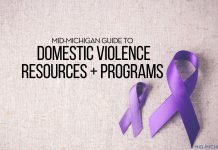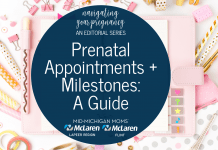Mid-Michigan Moms is thrilled to partner with McLaren Lapeer Region and McLaren Flint to bring you Navigating Your Pregnancy, an editorial series event. In this installment of our Editorial Series Collection, McLaren, and the #MidMichiganMoms team share fifteen different posts addressing all aspects of life as a pregnant woman. From humor to stories of perseverance, no topic is left off the table. Below, Jessica Braman, Certified Nurse Midwife, shares her best tips for managing stress during pregnancy. Tune in, learn, share, and join the conversation!
Midwives and OB/GYNs are health professionals who will guide you from pre-pregnancy, during, and after birth. Often you may choose one or the other, but you can also choose to receive care from both.
 There are three types of midwives:
There are three types of midwives:
Certified Nurse Midwives (CNM)
Certified Nurse Midwives have a master’s degree in nurse-midwifery and are RN’s who have graduated from an accredited program and passed a national certification exam. They
must have a license to practice in their state, can prescribe most medications, and 95% of them practice in a hospital setting.
Certified Midwives
Certified Midwives have a bachelor’s degree in another field other than nursing but have the same midwifery education and must pass the same national certification exam as CNM’s. They must also have a license to practice in their state and most work in a hospital setting.
Certified Practice Midwives (CPMs)
Certified Practice Midwives may have apprenticeship training, may graduate from an accredited education program, pass a different certification exam than CNM’s and Certified Midwives, usually work in birth centers and homes, and cannot prescribe most medications.
Midwives provide much of the same care as OB/GYNs. This includes pregnancy, labor and labor pain management, birth, and postpartum care. They also manage things like family planning, preconception and infertility counseling, prescriptions, contraception, gynecologic care, cancer screening and mammography, immunizations, menopause, sexual health management, sexually transmitted infections, and well-woman/primary care visits.
Depending on the risk level, midwives can consult, co-manage, or transfer care to an OB/GYN if needed when a pregnancy or delivery becomes high risk during care.
Midwives tend to have a more holistic/ naturalistic view of pregnancy and specialize in natural or unmedicated birth but are also able to manage pain medication and epidurals if that is what the patient chooses. Midwives focus generally on education and shared decision making with their patients so that the patient may make whatever medical decisions are right for them and their family.
Midwives and OB/GYNs both guide you from pre-pregnancy, during, and after birth. Again, you may choose one or the other, but you can also choose to receive care from both.















